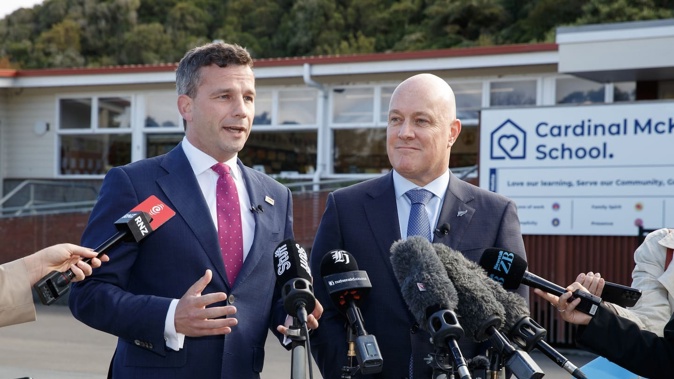
Act leader David Seymour says it would be a breach of the coalition agreement if Prime Minister Christopher Luxon sacked or stripped an Act minister of portfolios in the same way the PM did Melissa Lee and Penny Simmonds.
It comes after Luxon said the surprise reshuffle last week was his decision as Prime Minister, but was done after consulting his coalition partners.
It also followed public disagreement between Seymour and Luxon after the PM stated the Act leader’s comments criticising the Waitangi Tribunal were “ill-considered”. Seymour later said it wasn’t appropriate to initially air those views through the media, instead of in-person.
Seymour, fronting a press conference after announcing the Government’s Pharmac funding, was asked to explain what process would be followed should an Act minister commit a sackable offence.
The matter related to Luxon’s demotion of Lee as Media and Communications Minister, which also meant she was kicked out of Cabinet, and Simmonds as Disability Issues Minister.
Luxon claimed he’d made the decision because there were significant challenges in both portfolios. Both Lee and Simmonds had come under increasing pressure - Lee for how she’d handled the fallout from Newshub’s impending closure and cuts at TVNZ, and Simmonds for the financial woes of the Ministry of Disabled People and how it had communicated new limitations being imposed on entitlements.
Both Seymour and New Zealand First leader Winston Peters were informed of the reshuffle before it was made public.
As he announced the reshuffle, Luxon said: “This is my decision but I wanted to make sure [Seymour and Peters] were on board and they are on board and aligned with what we’re doing.”
Seymour today stressed the scenario of an Act minister committing such an offence was “hypothetical”, but confirmed Luxon wouldn’t be able to dismiss a minister from another party without testing the coalition agreement.

Prime Minister Christopher Luxon announcing his reshuffle on Wednesday. Photo / Mark Mitchell
“There’s no way that I would expect another party leader to unilaterally sack an Act minister, that would be a breach of the faith in the coalition agreement, that would be a major problem.
“But nor would I expect Chris Luxon to behave in that way because we are uniformly collegial in the way we work together.”
Regarding future reshuffles, Seymour acknowledged he was open to portfolios being shifted from Act ministers if it was warranted.
“I think it really depends on what it is that the people need from the Government and how we’re delivering it.
“At the moment, I really think Act’s ministers are knocking it out of the park, it’s hard to see why you would want to move any of them.
“On the other hand, you get down the track, maybe there will be new challenges, new opportunities, and you get into a discussion about making some changes.”
Act leader David Seymour doesn't think his ministers have shown any signs of failure. Photo / Michael Craig
Disagreements within the coalition bubbled to the surface earlier this month when Luxon, while on his trip through South East Asia, said of Seymour’s suggestion the Waitangi Tribunal should be “wound up”: “Those remarks are ill-considered. Ministers need to exercise good judgement.”
The remarks from both ministers could be a breach of the Cabinet Manual, which required ministers to refrain from criticising the judiciary.
Seymour later said he was surprised Luxon had made such comments through the media instead of speaking with him first. The Act leader said he’d have a conversation with Luxon about the matter.
Seymour today described that conversation as a “really collegial discussion with great uniformity”.
He didn’t agree with Luxon’s view that his comments were ill-considered.
What does the coalition agreement say?
Regarding the actions of ministers, the agreement between National and Act said all ministers are bound by the Cabinet manual. Breaches of the Cabinet manual can be enough for a minister to be sacked.
The agreement also stated any concerns between the parties would be raised in confidence “as soon as possible and in good faith”, to allow the “speedy resolution of such matters in private”.
It outlined the parties’ chiefs of staff would be informed first and if issues were not resolved, it could be elevated to a discussion between party leaders.
This story was originally published on the Herald, here
Take your Radio, Podcasts and Music with you









